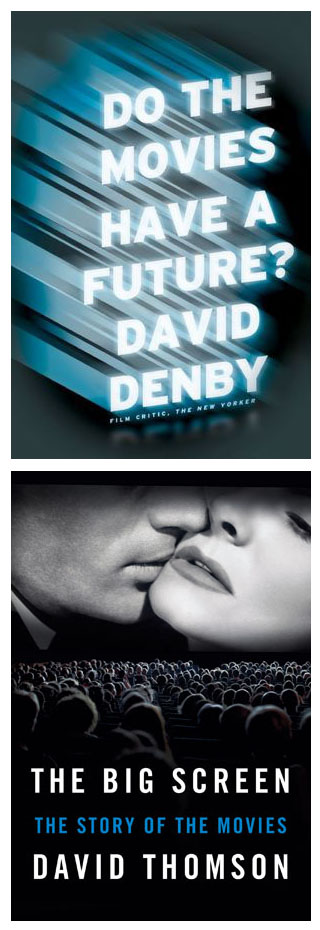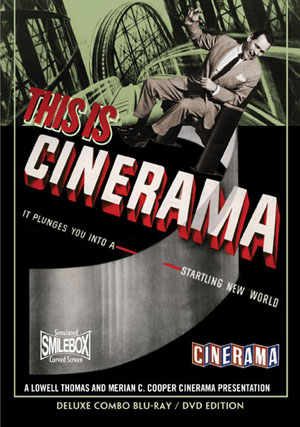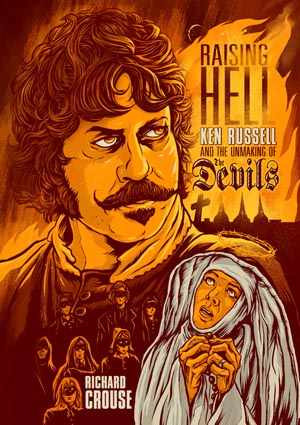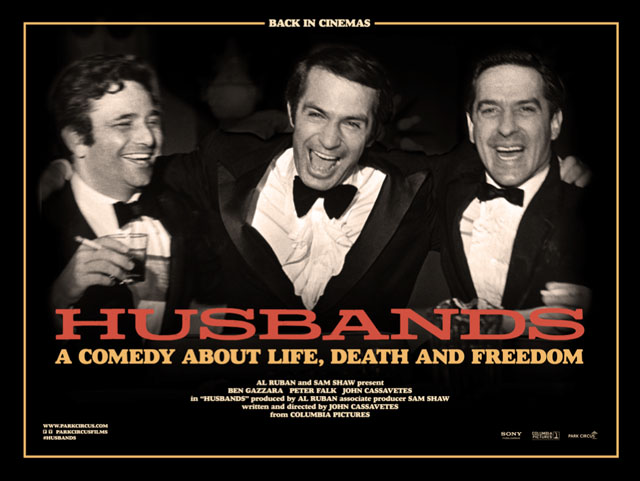Last week, David Denby and David Thomson were stirring it up a bit with side-by-side laments in the New Republic titled, respectively, “Has Hollywood Murdered the Movies?” and “American Movies are Not Dead: They are Dying.” As the New Yorker‘s Richard Brody notes in a followup to his initial response, “the ‘Death of Movies’ think piece is, by now, a familiar genre, in which digital technology, as employed by Hollywood, has become a stock villain…. Whereas David Denby takes note of the industry’s artistic luminaries and wishes that more people would see and discuss their movies, David Thomson has pretty much given up.”
Well, both Davids have books coming out this month. The title of Denby’s, Do Movies Have a Future?, suggests that he’ll expand on the argument laid out in TNR, but no, as we learn in two interviews with Denby, Richard Horgan‘s for FishbowlLA and Rachel Martin‘s for NPR, the book is primarily a collection of reviews written over the past dozen years or so. Thomson, though, really is going whole hog. Summing up the argument he’ll be making in The Big Screen: The Story of the Movies and What They Did to Us (and he’ll be elaborating on Wednesday in Bristol), he writes in the Independent: “What is most important is the fact of the screen as something that separates us from reality…. Once you’ve identified the primacy of the screen you begin to see that all films are more alike than they are different…. I fear film studies, film in academia and good criticism of the medium are all McGuffins compared with the dislocating stealth of the screen.”
Oddly enough, in the excerpt from J. Hoberman‘s new book, Film After Film (Or, What Became of 21st Century Cinema?) (see, too, August‘s entry), recently posted by the New York Review of Books, we find another disassociation-from-reality argument floated, but one of an entirely different sort. André Bazin, writes Hoberman, “imagined cinema as the objective ‘recreation of the world.’ Yet digital image-making precludes the necessity of having the world, or even a really existing subject, before the camera—let alone the need for a camera…. The history of motion pictures was now, in effect, the history of animation.” And a milestone of that history is The Matrix (1999) and “irresistible ruling metaphor that was heightened in its force by the approaching millennium—humanity lives in simulation, in a computer-generated illusion created to conceal the terrifying Desert of the Real…. Despite its fantastic premise, The Matrix evoked and identified a recognizable world—a new social reality in which freedom and social control had merged, while information, entertainment, fantasy, advertising, and communication seemed indistinguishable.” Whatever this new social reality is, “one cannot stand outside it.” Emphasis mine, so as to further distinguish Hoberman’s argument from Thomson’s. “Thus,” continues Hoberman, “in the universe of The Matrix, Bazin’s dream arrived as a nightmare, in the form of a virtual cyber existence: Total Cinema as a total dissociation from reality.”
More reading. And another funeral. “Film culture, at least in the sense people once used that phrase, is dead or dying,” argues Andrew O’Hehir in Salon. “I think it pretty much ended with Pulp Fiction, the brief indie-film boom of the late ’90s and the rise of the Internet. It’s just taken us a while to realize it.” And what’s taken its place? Tentpole movies and gossip about the industry that makes them; and “the undisputed cultural primacy of televised serial drama in the 21st century.”
Nicole Brenez, Kevin B. Lee, Dan Sallitt, and Vadim Rizov discuss canon-building and more in the third round of the ongoing discussion of the 2012 “Greatest Films of All Time” poll at Sight & Sound. Seriously, I know this is a thick entry overloaded with reading to catching up with, but this is great stuff.
Measuring the impact of the Oberhausen Manifesto, 50 years on: Eric Rentschler (Artforum) and Candace Wirt (Notebook).
“Cinerama’s unique accomplishment lies partly in its unintended consequences,” writes David Bordwell. “Seeking to become the most realistic form of cinema yet known, Cinerama demonstrates how enjoyably un-realistic, even surrealistic, movies can be.”
At Movie Morlocks, Susan Doll considers a great big round of “Movies About the Movies.”
As noted in the entry on Barry Levinson’s The Bay, Not Coming to a Theater Near You has launched the 9th edition of 31 Days of Horror: One review of a horror movie per day, every day in October. This year’s edition features three sidebars: black vampires, Sasquatch cinema, and Bill Rebane. And Bill Ryan has launched his annual The Kind of Face You Slash series, focusing on horror literature.
Jane Hu for Hyperallergic: “GIF Typologies and the Heritage of the Moving Image.”
At Sundance NOW, Michael Atkinson argues that George Lucas’s THX 1138 (1971) is “one of the ’70s’ most powerful political films.”
Taking down Won’t Back Down: Dana Goldstein (Nation) and A.O. Scott (New York Times).
The Unspeakable Act is “a very sober look at the issue of sexual desire between siblings” by Dan Sallitt, “one of the most underappreciated major American indie writer/directors out there,” argues J.J. Murphy.
More books. Murphy’s latest is The Black Hole of the Camera: The Films of Andy Warhol, which Branden W. Joseph reviews alongside Douglas Crimp’s “Our Kind of Movie”: The Films of Andy Warhol in the new issue of Artforum. Both books, he argues, “reveal the scope and importance of Warhol’s dauntingly large cinematic corpus. While differing from each other in style, approach, and organization, both are likely to be consulted for years to come.”
Tay Garnett, who directed, among many other films, the 1946 version of The Postman Always Rings Twice with John Garfield and Lana Turner, also “wrote a corking autobiography,” notes Farren Nehme, “called Light Your Torches and Pull Up Your Tights, after the on-set directions he got as an extra in a historical epic. The Siren has, as we all know, read way too many Hollywood memoirs so believe her when she says that this is one of the liveliest, most enjoyable and original you will ever pick up. If you can pick it up, that is. It’s out of print. Now his daughter Tiela has embarked on a project to get the book back into circulation, and at the same time resurrect her father’s memory with the public. The Siren hasn’t pointed out Kickstarter campaigns before, and has no plans to make a habit of it, but she can’t resist this one, because the book really is wonderful.”
Tobias Grey for the Hollywood Reporter: “In his entertaining and hyperbolic Raising Hell: Ken Russell and the Unmaking of The Devils, Canadian movie critic Richard Crouse attempts to answer why Russell’s 1971 film The Devils—based on a story about an incident of mass hysteria among a convent of nuns in 17th century France—became such a flash point in what would seem to have been an unshockable era.”
In the TLS, Ben Masters looks back on Anthony Burgess’s A Clockwork Orange, 50 years on.
Interviews. At the Walker Art Center, Matt Levine talks with Mark Cousins about his 15-hour documentary The Story of Film: An Odyssey, Nigel Andrews profiles Marco Bellocchio for the Financial Times (via Movie City News), and Joshua Jelly-Schapiro revisits Andrei Tarkovsky‘s Stalker (1970) with Geoff Dyer.
In other news. “Béla Tarr is running a PhD-level film program, offering a blend of theory, practice and ‘probing questions’ about the nature of civilization. Freshers’ week looks set to be a hoot,” notes the Guardian‘s Xan Brooks. “Tarr will serve as director and dean of the new filmmaking academy, which runs at the Sarajevo School of Science and Technology, partnered with the University of Buckingham (motto: ‘Flying On Our Own Wings’), while the list of visiting lecturers includes the actor Tilda Swinton and directors Carlos Reygadas, Aki Kaurismäki, Jim Jarmusch and Apichatpong Weerasethakul. Applications are open from October 1-21, with 16 lucky candidates selected for the course. Variety reports that the tuition fee is $19,000 a year.”
“A total of 85 days after they first went on strike, workers at Rome’s famous Cinecittà Studios on Friday agreed to go back to work—at least temporarily.” Eric J. Lyman has the full story in the Hollywood Reporter.
Seth MacFarlane will host the 85th Academy Awards on February 24.
New York. Investigation of a Citizen Above Suspicion (1970) is at Film Forum through Thursday. David Fear in Time Out New York: “A paranoid police procedural, a perverse parable about the corrupting elements of power, and a candidate for the greatest predated Patriot Act movie ever, Elio Petri’s stunning thriller makes no attempt to hide the culprit behind the film’s grisly murder: It wants you to know that Gian Maria Volonté’s dapper killer is responsible for the beautiful corpse splayed out on those black silk bedsheets. The shocks here are (a) that the spaghetti-Western stalwart isn’t wearing a cowboy hat for once, and (b) that Volonté is not just the criminal, he’s also the homicide detective heading up the investigation.” More from Elise Nakhnikian in the L.
There’s a John le Carré series on at BAMcinématek through Wednesday, and Mónica López-González has a big, big overview at Cinespect, and you’ll find two recommendations at the L: Steve Macfarlane on Martin Ritt’s The Spy Who Came in From the Cold (1965) and Elina Mishuris on Sidney Lumet’s The Deadly Affair (1966).
Seattle. In the Stranger, Charles Mudede recommends three films screening at the Local Sightings Film Festival, on through Thursday.
Albuquerque. The Southwest Gay and Lesbian Film Festival runs through Sunday.
U.K. “Always ballsy, often brilliant, sometimes exasperating, John Cassavetes’s 1970 picture Husbands is now on rerelease,” notes the Guardian‘s Peter Bradshaw. “Peter Falk, Ben Gazzara and Cassavetes himself play Archie, Harry and Gus respectively, three middle-aged married friends who experience a kind of three-way midlife breakdown when their best buddy dies…. What texture and flavor this movie has.” The BFI’s Geoff Andrew: “With its ultra-naturalistic performances, its simple, meandering narrative (‘story’ is far too strong a word for what happens) and its long takes, it makes for a warts-and-all study of male pride, self-pity, frustration and friendship that is at once properly serious and sharply funny.”
More from Dave Calhoun (Time Out London, 4/5), Philip French (Observer), Patrick Gamble (CineVue, 3/5), and Matt Thrift (Little White Lies).
Amsterdam. The exhibition Expanded Cinema: Isaac Julien, Fiona Tan, Yang Fudong is on view at the EYE Film Institute through December 2.
Munich. Open End, on view through April 7, “is the fourth exhibition in an ongoing series of presentations of film and video works from the Goetz Collection in Haus der Kunst.”
Berlin. On Friday, Christoph Hochhäusler, Dirk Cieslak, and Anett Hardegen will chat about Adam Curtis at Vierte Welt; entrance is free.
In the works. Casting news from the Playlist: David Thewlis has joined Christoph Waltz and Melanie Thierry in Terry Gilliam’s The Zero Theorem, and Tilda Swinton will have a cameo. Judi Dench and Steve Coogan are lined up for Stephen Frears’s Philomena. Martin Freeman and Eddie Marsan will join Nick Frost, Simon Pegg, and Rosamund Pike in Edgar Wright’s The World’s End.
“Richard Kelly (Donnie Darko) has lined up his next movie, a true-crime thriller titled Amicus that will star Nicolas Cage as Rodney Smolla, one of the most influential First Amendment scholars of the past two decades,” reports Variety‘s Jeff Sneider.
Obit. What with the festivals and the weekend, we haven’t yet gotten around to noting that Herbert Lom, “best known for playing Charles Dreyfus in the Pink Panther films, has died aged 95,” as the BBC reported on Thursday. “The Czech-born, London-based actor starred opposite Peter Sellers in several films as Inspector Clouseau’s irritable boss. Lom appeared in more than 100 films during his 60-year acting career, including such classics as The Ladykillers, Spartacus and El Cid.” Ronald Bergan has an appreciation in the Guardian, where Andrew Pulver collects several clips. Joe Leydon recalls meeting his childhood idol; more from Farran Nehme.
Viewing. Trailer (2’29”) for Park Chan-wook’s Stoker, with Nicole Kidman, Mia Wasikowska, and Matthew Goode, and Art of the Title‘s montage (5’06”) for Graphic Design: Now in Production, an exhibition on view at the Hammer Museum in Los Angeles through January 6.
For news and tips throughout the day every day, follow @KeyframeDaily on Twitter and/or the RSS feed. Get Keyframe Daily in your inbox by signing in at fandor.com/daily.







